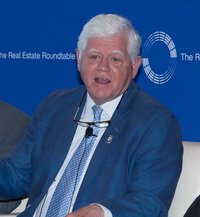
Leading industry experts convened on Oct. 30 at the National Press Club in Washington for an in-depth discussion on IRS Notice 2007-55, which levies discriminatory tax penalties on foreign investment in U.S. real estate and infrastructure. The panel detailed how the Notice subjects foreign owners of domestically controlled real estate investment trusts (REITs) to the Foreign Investment in Real Property Tax Act of 1980 (FIRPTA) when the REIT liquidates, thereby suppressing capital investment and job creation in the real estate industry.
- The 2007 tax guidance from the IRS overturned long-standing practice that treated liquidating distributions and redemptions of REITs as sales of stock. Under Notice 2007-55, these transactions are now treated as taxable distributions and subject to a burdensome capital gains tax – affecting only foreign shareholders. In the 12 years since Treasury issued the Notice, there have been no clarifying regulations, which has created uncertainty among potential investors and deterred foreign investment in U.S.-based real estate and infrastructure.
- Panelists at the event, sponsored by Unibail-Rodamco-Westfield, included Ryan McCormick, Senior Vice President and Counsel for The Real Estate Roundtable (far right in photo above); John Jones, Vice President of Government Relations for Nareit; Kevin Klein, Director of Tax Policy for the Organization of International Investment (OFII); Darin Mellott, Director of Research, Americas at CBRE; and David Polster, Tax Partner at Skadden Arps.
- McCormick emphasized that FIRPTA is a tax burden that does not apply to any other asset class and noted that FIRPTA hurts the ability of the United States to attract outside capital for infrastructure improvements. Treasury could act on its own to remove much of the FIRPTA burden simply by withdrawing the IRS guidance. “Anything the Administration can be doing now to drive our economy forward and create jobs, they should,” said McCormick.
- Outright repeal of the outdated FIRPTA law is The Roundtable’s ultimate policy goal. In April 2019, Representatives John Larson (D-CT) and Kenny Marchant (R-TX) introduced the Invest in America Act (H.R. 2210), a bill to repeal FIRPTA altogether. The Roundtable and 19 national trade organizations – representing every aspect of constructing, developing, financing, owning, and managing real estate and infrastructure in the United States – wrote to Ways and Means Committee Members and other key House lawmakers urging them to support the legislation. (Comment Letter, March 28)
- Both Republican and Democratic lawmakers agree on the negative impact that the Notice continues to exert on infrastructure investments. In 2017, 32 bipartisan members of the House Ways and Means Committee wrote to Treasury Secretary Steven Mnuchin urging him to repeal the Notice. The lawmakers pointed to billions of dollars’ worth of investment that flowed to small and mid-sized communities when 2015 legislation eased some of the tax burden for foreign investors.
A report by the Rosen Consulting Group (RCG) estimated that FIRPTA repeal would generate an initial increase of between $65 billion and $125 billion in international investment in U.S. commercial real estate. This new level of activity would lead to the creation of 147,000 to 284,000 jobs throughout the economy and increase taxpayers’ income by $8 billion to $16 billion. (Unlocking Foreign Investment in U.S. Commercial Real Estate, July 2017)
# # #






